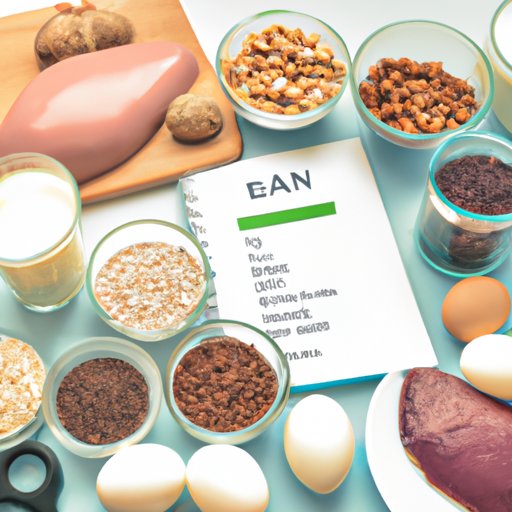Introduction
Protein is an essential nutrient that plays a key role in the body’s growth and development. It helps build and repair muscles, skin, bones, and other tissues, and it is also necessary for the production of hormones, enzymes, and antibodies. However, many people struggle to get enough protein in their diets, which can lead to various health issues over time. With this in mind, it’s important to understand the best ways to get more protein in your diet.
Eating More Lean Meats
Lean meats are a great source of protein, as well as other essential vitamins and minerals. Some examples of lean meats include chicken breast, lean ground beef, pork tenderloin, turkey breast, and salmon. These types of meats are relatively low in fat and high in protein, making them a great option for those looking to increase their protein intake.
In addition to providing protein, lean meats are also a great source of B vitamins, iron, zinc, and selenium. They can help boost energy levels, support healthy muscle growth, and promote overall wellbeing. Eating lean meats regularly can help ensure you get the protein you need while also reaping the benefits of other essential nutrients.
Incorporating Plant-Based Proteins
For those who don’t eat meat, plant-based proteins can be a great way to get the protein they need. There are a variety of plant-based proteins available, such as beans, lentils, quinoa, tofu, tempeh, nuts, and seeds. These foods are packed with protein, fiber, and other essential nutrients.
Plant-based proteins are not only a great source of protein, but they are also incredibly versatile and can be used in a variety of dishes. They can be incorporated into salads, soups, stews, stir-fries, casseroles, and much more. Eating plant-based proteins can help ensure you get the protein you need while also providing a range of other essential nutrients.
Including Dairy Products
Dairy products such as milk, cheese, and yogurt are another great source of protein. Milk is a particularly good source of protein, as it contains 8 grams of protein per cup. Cheese and yogurt are also great sources of protein, with 6 grams and 10 grams per ounce, respectively.
In addition to providing protein, dairy products are also a great source of calcium, vitamin D, and other essential vitamins and minerals. Eating dairy products regularly can help ensure you get the protein you need while also providing other essential nutrients for optimal health.
Adding Nuts and Seeds
Nuts and seeds are another great source of protein, as well as a range of other essential vitamins and minerals. Examples of nuts and seeds that are high in protein include almonds, walnuts, pumpkin seeds, chia seeds, and sesame seeds. These foods are relatively low in calories and are packed with protein, making them a great option for those looking to increase their protein intake.
Nuts and seeds can be eaten as a snack on their own or added to salads, yogurt, oatmeal, and other dishes. Eating nuts and seeds regularly can help ensure you get the protein you need while also providing other essential nutrients for optimal health.
Protein Shakes and Smoothies
Protein shakes and smoothies are a great way to get extra protein into your diet. Protein powders are widely available and come in a variety of flavors, including chocolate, vanilla, and strawberry. They can be mixed with milk, water, or other liquids to make a protein shake or smoothie. These drinks are relatively low in calories and provide a convenient way to increase your protein intake.
In addition to providing protein, protein shakes and smoothies can also be a great source of other essential nutrients, such as vitamins and minerals. Drinking protein shakes and smoothies regularly can help ensure you get the protein you need while also providing other essential nutrients for optimal health.
Eating More Eggs and Egg Whites
Eggs and egg whites are another great source of protein. One large egg contains about 6 grams of protein, while one large egg white contains about 4 grams of protein. In addition to providing protein, eggs and egg whites are also a great source of other essential nutrients, such as vitamin D, choline, and selenium.
Eggs and egg whites can be eaten on their own or incorporated into a variety of dishes. Eating eggs and egg whites regularly can help ensure you get the protein you need while also providing other essential nutrients for optimal health.
Using Protein-Rich Ingredients in Baking Recipes
Baking recipes can be a great way to get more protein in your diet. For example, you can use protein-rich ingredients like almond flour, oat flour, and chickpea flour in baking recipes. These ingredients can provide a good source of protein while also adding flavor and texture to your baked goods.
In addition to providing protein, these ingredients can also be a great source of other essential nutrients, such as fiber and healthy fats. Using protein-rich ingredients in baking recipes can help ensure you get the protein you need while also providing other essential nutrients for optimal health.
Conclusion
Getting enough protein in your diet is essential for optimal health. To ensure you get the protein you need, it’s important to understand the best ways to get more protein in your diet. Eating more lean meats, incorporating plant-based proteins, adding dairy products, eating nuts and seeds, drinking protein shakes and smoothies, consuming eggs and egg whites, and using protein-rich ingredients in baking recipes are all great ways to add more protein to your diet.
(Note: Is this article not meeting your expectations? Do you have knowledge or insights to share? Unlock new opportunities and expand your reach by joining our authors team. Click Registration to join us and share your expertise with our readers.)
